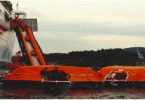Global maritime technology innovator Martek Marine stated it has been included on a framework contract by the European Maritime Safety Agency (EMSA) for Remotely Piloted Aircraft Systems (RPAS) services in the maritime environment.
What is EMSA?
European Maritime Safety Agency (EMSA) was established for the purpose of ensuring a high, uniform and effective level of maritime safety and prevention of pollution by ships.
Why is it necessary?
Due to the recent entering into force of the new limits for sulphur content of marine fuels since January 1, 2015, Directive (EU) 2015/253 of February 16, 2015 laying down the rules concerning the sampling and reporting under Council Direc¬tive 1999/32/EC as regards the sulphur content of marine fuels, SOx emissions from ships need to be monitored. The enforcement by the Member States under Directive 1999/32/EC (as amended) will require monitoring of the emissions and information exchange between the responsible administrations.
To increase environmental surveillance capabilities, data from new sensors, in particular from RPAS, are to be incorpo¬rated to provide information to the Member States. EMSA will organize and provide, as an institutional service provider, pilot RPAS service operations in support of Member States focusing on marine pollution detection and monitoring and emissions monitoring. However, this technology has a multipurpose character and could in an emergency be used for other purposes, if necessary or requested by the Member States, the European Commission, and other EU agencies.
Martek Marine has been awarded one of several framework contracts launched by EMSA which deals with “Remotely Piloted Aircraft System (RPAS) services in the maritime environment”. The contract won by Martek is specifically for ship engine emission monitoring by RPAS. This new requirement requires an RPAS (drone) to sample gasses from a vessel’s emissions plume by using a sophisticated payload of electro-optical, infra-red imaging, gasw emission, and AIS detection sensors.



